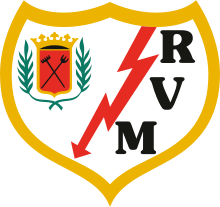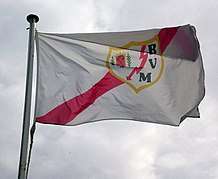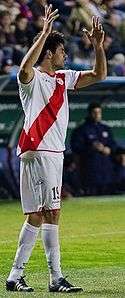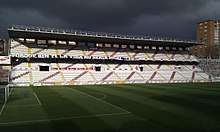Rayo Vallecano
 | ||||
| Full name | Rayo Vallecano de Madrid, SAD | |||
|---|---|---|---|---|
| Nickname(s) |
Los Franjirrojos (The Red Sashes) Los Vallecanos (The Vallecans) | |||
| Founded | 29 May 1924 | |||
| Ground |
Campo de Fútbol de Vallecas, Madrid, Spain | |||
| Capacity | 14,708 | |||
| Owner | Raúl Martín Presa | |||
| Chairman | Raúl Martín Presa | |||
| Manager | Michel | |||
| League | La Liga | |||
| 2017–18 | Segunda División, 1st (promoted) | |||
| Website | Club website | |||
|
| ||||


Rayo Vallecano de Madrid, S.A.D. (Spanish pronunciation: [ˈraʝo βaʎeˈkano ðe maˈðɾið]),[lower-alpha 1] often abbreviated to Rayo, is a Spanish football team based in Madrid, in the neighbourhood of Vallecas. Rayo was founded on 29 May 1924, and currently compete in La Liga following promotion from the Segunda División. Home games are held at the 14,708-seater Campo de Fútbol de Vallecas stadium.
Rayo has competed in one European competition, the UEFA Cup in the 2000–01 season. The club made it to the quarter-finals before losing to Spanish club Alavés 4–2 on aggregate.
History
Rayo Vallecano saw the light of day on 29 May 1924 in the hometown of Prudencia Priego, wife of the club's first president Julián Huerta. Greatly inspired by River Plate (a Football club from Argentina), in 1949, after an agreement with Atlético Madrid, a red diagonal stripe was added to the team's kit, and the club reached Tercera División for the first time in its history.[1]
One of the perennial yo-yo clubs of Spanish football, and always in the shadow of the two biggest clubs in the city (Real Madrid and Atlético Madrid), Rayo Vallecano spent many years during the 1980s and 1990s moving back and forth between La Liga and Segunda División. They appeared to have consolidated their top flight status after gaining promotion in 1999, and the team's most successful season came in 2000–01 when they reached the quarter-finals of the UEFA Cup, going out only to eventual runners-up Alavés;[2] Rayo finished ninth in the previous campaign, but entered the competition via the fair play draw.[3]
However, the club shortly thereafter fell on hard times, enduring successive relegations in 2003 and 2004. For 2005–06 manager Míchel, a Real Madrid legend in the 1980s and '90s, was hired.[4]
Rayo finished the 2006–07 season in second place in Segunda División B, winning the promotion play-off semifinal but losing in the final to Eibar (1–2 aggregate).[5] The following campaign, the team returned to division two after a four-year absence after a victorious run in the playoffs, disposing of Benidorm in the semi-final and Zamora in the last game 2–1 on aggregate.[6]
In the first season back in the second tier of Spanish football, Rayo finished comfortably, often either in or just outside the promotion places. That same year, its women's team was crowned league champions for the first time, thereby qualifying for the UEFA Women's Champions League, but was eliminated 2–5 on aggregate in the round-of-32 by Russia's WFC Rossiyanka.
In 2010–11, Rayo Vallecano ranked in second position and returned to the top flight after an eight-year absence, only trailing champions Real Betis in spite of very serious economic problems.[7][8][9] In late March 2012, in support of the 2011–12 Spanish protests, the squad decided to take one day off from training to join the demonstrations.[10]
In August 2015, Rayo Vallecano purchased the majority of Oklahoma City FC, a NASL expansion franchise which had yet to officially play a game renaming the club to Rayo OKC, despite the stadium increasingly needing work. It was the first ever entry of a Spanish club into the American sports market and mirrored a 2013 sponsorship agreement with Qbao in terms of expanding the club's profile overseas.[11][12] Rayo OKC folded after a year or so due to Rayo Vallecano's relegation from the Primera División and a dispute between the co-owners of Rayo OKC, led to less finance for the U.S. side.
In May 2016, Rayo Vallecano were relegated to the Segunda División, finishing 18th in the 2015–16 La Liga season. This ended their five-year streak in La Liga, their longest ever stay in the top-flight.[13]
Rayo's first season back in Segunda División was a poor one, with both problems on the field and off, it led to them to finish in 12th position. Rayo went through 3 different managers in the 2016–17 Segunda División season and finally settling on club legend Míchel.[14] He revived the club from the relegation places to 12th, almost making the playoffs.
At the start of the 2017–18 Segunda División season, the club appointed recently retired goalkeeper for Rayo - David Cobeño as the sporting director of the club.[15] Rayo secured their return to the Primera Division with a 1-0 over Lugo on the 41st game of the season.[16]
Club background
- Agrupación Deportiva El Rayo (29 May 1924 – 13 November 1947)
- Agrupación Deportiva Rayo Vallecano (13 November 1947 – 1995)
- Rayo Vallecano de Madrid (1995–present)
N.B. Affiliate of Club Atlético de Madrid in 1949–50
Season to season
|
|
- 18 seasons in La Liga
- 34 seasons in Segunda División
- 5 seasons in Segunda División B
- 11 seasons in Tercera División (third level before 1977–78)
European history
| Season | Round | Club | Home | Away | Aggregate |
|---|---|---|---|---|---|
| 2000–01 UEFA Cup | Qualifying round | 6–0 | 10–0 | 16–0 | |
| First round | 1–1 | 1–0 | 2–1 | ||
| Second round | 1–0 | 1–2 | 2–2 (a) | ||
| Third round | 2–0 | 0–0 | 2–0 | ||
| Fourth round | 4–1 | 2–1 | 6–2 | ||
| Quarter-finals | 2–1 | 0–3 | 2–4 | ||
Current squad
- As of 31 August 2018[17]
Note: Flags indicate national team as defined under FIFA eligibility rules. Players may hold more than one non-FIFA nationality.
|
|
Reserve team
Note: Flags indicate national team as defined under FIFA eligibility rules. Players may hold more than one non-FIFA nationality.
|
|
Out on loan
Note: Flags indicate national team as defined under FIFA eligibility rules. Players may hold more than one non-FIFA nationality.
|
|
Current technical staff
| Position | Staff |
|---|---|
| Manager | |
| Assistant manager | |
| Fitness coach | |
| Scout | |
| Fitness coach | |
| Goalkeeping coach |
Last updated: May 2018
Source: Rayo Vallecano
Notable former players
Note: this list includes players that have played at least 100 league games and/or have reached international status.
Managers
|
|
|
Club presidents
|
|
|
|
Stadium
Campo de Fútbol de Vallecas is a football stadium located on Calle Payaso Fofó 1, Vallecas. Opened on 10 May 1976, at first it was called "New Stadium Vallecas", but in January 2004, 13 years after the arrival of the Ruiz-Mateos family in 1991, it changed denominations, as the wife was also named by her husband, businessman José María, the first woman president of an elite football team.
It has a capacity of 14,708 spectators in an all-seated format, and dimensions of 102×64 m. Additionally, one of the goal ends does not have a grandstand, just a big wall with information panels.
In June 2009, the club announced plans for the construction of a new stadium.
Hymn
Although most people recognise the supporting songs by ska band Ska-P, Rayo Vallecano has an official hymn played at the stadium in home matches.
Rayo Vallecano always plays
with bravery, courage and nobility.
In every game it gives its heart
and chest and aspire to be the best.
No one can take the triumph from its hand,
when Rayo Vallecano is out to score.
Rayo Vallecano makes a virtue out of its game.
Rayo Vallecano is strength and youth.
To see the clean triumph of your colours
your fans follow you, and don't care where to,
and unanimous trumpet their cheerful voices.
Rayo has the nerve of a champion.
No one can take the triumph from its hand,
when Rayo Vallecano is out to score.
Rayo Vallecano makes a virtue out of its game.
Rayo Vallecano is strength and youth.
Alabi! Alaba!
Rayo Vallecano!
Ra, ra, ra!
Miscellaneous info
- Rayo Vallecano was Laurie Cunningham's last club – he was killed in a car crash just outside Madrid in 1989, after a sole season. He also had represented neighbours Real Madrid for four years.
- Spanish anti-fascist band Ska-P are outspoken supporters of the club and have dedicated two songs to it, named Como un Rayo and Rayo Vallecano.
- In March 2014, Huawei agreed to sponsor Rayo Vallecano for two league matches against Real Madrid and Athletic Bilbao.[18]
- In 2014, 85-year-old Vallecas resident Carmen Martínez Ayuso was evicted from her house after living there since the 1960s. Rayo Vallecano and particularly coach Paco Jémez were touched by her story, and subsequently offered to fund Martínez for the foreseeable future.[19]
- Rayo's players are often involved in charity work, one instance of this is that the current club captain Roberto Trashorras, amongst other players, regularly helps out at a homeless shelter.
Fans
- Rayo's ultras- The Bukaneros - are known for their left-wing views and often display political messages and other protests, mainly against the commercialisation of football. Rayo's ultras often display anti-racism, anti-fascist and anti-homophobia messages, however, are often ostracised by the government because they are branded as an ultras, this occurred following the death of Deportivo La Coruña fan known as 'Jimmy' who died following clashes between fans, with the Bukaneros not involved at all in the clashes.
- The club is known for being the last neighbourhood club in Spain. As a result, the club represents the barrio and its working-class status.
- The club is known for chanting the song "La Vida Pirata" or in English "The Pirate Life" (a song based on the life pirates, in which the Bukaneros are named after).
Spanish:
La vida pirata es la vida mejor (bis)
sin trabajar (bis)
Sin estudiar (bis)
Con la botella de ron (bis)
Soy capitán (bis)
de un barco inglés (bis)
Y en cada puerto tengo una mujer (bis)
La rubia es (bis)
Fenomenal (bis)
Y la morena tampoco esta mal (bis)
Las inglesas con su seriedad (bis)
Y las francesas que todo lo dan (bis)
Si alguna vez (bis)
Me he de casar (bis)
Me he de casar (bis)
Con la del Rayo, una, una y no más (bis).''
English:
''The pirate life is the best life (bis)
without working (bis)
without studying (bis)
With the bottle of rum (bis)
I am captain (bis)
of an English ship (bis)
and in each port, I have a woman (bis)
the blonde is (bis)
phenomenal (bis)
and the brunette is not bad either (bis)
The English women with their seriousness (bis)
And the French women who give everything (bis)
If ever (bis)
I have to marry (bis)
I have to marry (bis)
with the one of Rayo, one, one and no more (bis).''
Notes
- ↑ In isolation, Vallecano is pronounced [baʎeˈkano].
References
- ↑ "Historia resumida del Rayo" [Brief history of Rayo] (in Spanish). Rayo Vallecano. Archived from the original on 7 April 2014. Retrieved 4 April 2014.
- ↑ "Alaves through as Rayo fall". BBC Sport. 15 March 2001. Archived from the original on 7 April 2014. Retrieved 4 April 2014.
- ↑ "El 'Fair Play', ¿una puerta abierta para jugar en Europa?" ['Fair Play', open door to play in Europe?] (in Spanish). Terra. 20 March 2013. Archived from the original on 7 April 2014. Retrieved 4 April 2014.
- ↑ "Michel, nuevo entrenador del Rayo" [Michel, new Rayo manager] (in Spanish). ABC. 23 June 2005. Archived from the original on 9 April 2014. Retrieved 4 April 2014.
- ↑ "El Eibar regresa a Segunda tras remontar ante el Rayo Vallecano" [Eibar returns to Segunda after coming back from behind against Rayo Vallecano] (in Spanish). Diario AS. 24 June 2007. Archived from the original on 7 April 2014. Retrieved 4 April 2014.
- ↑ "El Rayo vuelve a la División de Plata del fútbol español" [Rayo return to silver category of Spanish football] (in Spanish). Marca. 15 June 2008. Archived from the original on 14 May 2014. Retrieved 4 April 2014.
- ↑ Dona Teresa takes off mask Archived 2011-04-26 at the Wayback Machine.; Football Scouting, 1 March 2011
- ↑ Unpaid Rayo have sights set on La Liga payday Archived 2012-10-04 at the Wayback Machine.; Reuters, 30 March 2011
- ↑ Los jugadores del Rayo Vallecano seguirán sin cobrar (Rayo Vallecano players will still not be paid) Archived 2011-09-27 at the Wayback Machine.; El Correo Gallego, 26 February 2011 (in Spanish)
- ↑ "Rayo Vallecano players strike over Spanish austerity cuts". When Saturday Comes. 29 March 2012. Archived from the original on 31 March 2012. Retrieved 30 March 2012.
- ↑ "Rayo Vallecano set to buy Oklahoma City FC".
- ↑ "El Rayo compra la mayoría de acciones del Oklahoma City" [Rayo purchases majority of Oklahoma City shares] (in Spanish). AS. 19 August 2015. Archived from the original on 20 August 2015. Retrieved 21 August 2015.
- ↑ "La Liga: Getafe and Rayo Vallecano relegated, Sporting Gijon stay up".
- ↑ "Míchel has been appointed the new coach of Rayo Vallecano".
- ↑ "David Cobeño, new sports director".
- ↑ "Rayo Vallecano win promotion to La Liga".
- ↑ "Plantilla Rayo Vallecano de Madrid - Rayo - Web Oficial". Plantilla Rayo Vallecano de Madrid - Rayo - Web Oficial. Archived from the original on 31 July 2017. Retrieved 6 May 2018.
- ↑ "Huawei sponsors Rayo Vallecano for two matches, against Real Madrid and Bilbao". GSM Insider. 30 March 2014. Archived from the original on 30 March 2014. Retrieved 30 March 2014.
- ↑ Villalba, Juanjo (January 2015). "Spanish Football Team Rescues an Old Lady". Vice Magazine. 13 (1): 15.
External links
| Wikimedia Commons has media related to Rayo Vallecano. |
- Official website (in Spanish)
- Official Radio website (in Spanish)
- Official Community VK (in Russian)
- Futbolme team profile (in Spanish)
- BDFutbol team profile
- Rayo Herald – Updated club info (in Spanish)
